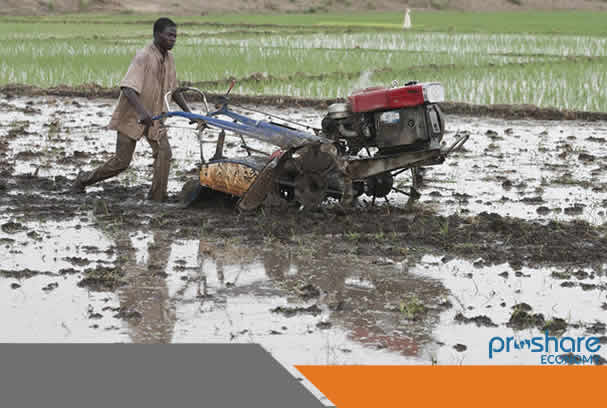Friday, October05, 2018 /02:10 PM / Distributed by APO Group on behalf of Food andAgriculture Organization (FAO)
New African Union-Food and Agriculture Organization of the UnitedNations (FAO) framework also aims to create new jobs while reducing reliance onmanual labor
FAO and the African Union today launched a newframework document that aims to increase agricultural efficiency and reducedrudgery by helping countries in Africa to develop strategies for sustainablefarm mechanization.
The Sustainable Agricultural Mechanization: A Frameworkfor Africa (SAMA) is the result of discussions with policy makers from AUmember states, the AU Commission, FAO and key partners. It offers a detailedlook at the history of machinery in Africa, and points the way towardsaddressing challenges and creating new opportunities to assure the successfuladoption of mechanization.
"Doubling agricultural productivity andeliminating hunger and malnutrition in Africa by 2025 will be no more than amirage unless mechanization is accorded utmost importance," AUCommissioner for Rural Economy and Agriculture, Josefa Sacko, said at thelaunch of the framework at FAO.
Remarkably more than three-fourths of farmers insub-Saharan Africa prepare their lands using only hand tools, a practice thatentails poor productivity, repels youth and is incompatible with thecontinent's Zero Hunger goal.
"Farmers in Africa should be able to use modernagricultural technology, both digital and mechanical, to boost the agriculturalsector in a sustainable way," said FAO Deputy Director-General MariaHelena Semedo.
The new framework identifies 10 priorities for AUmember states to include in their national plans, ranging from the need for astable supply of machine spare parts and innovative financing mechanisms, andthe importance of regional collaborations that allow for cross-border hiringservices.
The framework notes that successful nationalmechanization strategies will address key sustainability issues includinggender, youth, environmental protection and the overarching principle thatfarming must be profitable. It also emphasizes that these strategies shouldcover the entire agrifood value chain, including harvesting, handling,processing and food safety aspects, with an eye to reducing food losses,boosting rural employment and bolstering the links between farmers andconsumers.
Past, present andfuture
While tractors are used to prepare land on over 60percent of cultivated lands in Asia, the corresponding figure for Sub-SaharanAfrica is around 5 percent. Moreover, the use of draught animals in sub-SaharanAfrica is minimal outside of Ethiopia - due in considerable measure to thetsetse fly - so almost all the work is done manually.
One result is that many African farmers deploylow-yielding techniques and may prefer slash-and-burn methods.
Today smaller and more affordable machinery, such astwo-wheel tractors, are available hiring services using digital technologiesare proving popular around the continent, underscoring how the sharing ofcapital assets can be leveraged to achieve greater scale and access to moderntools.
What is to be done?
The framework notes that cross-border initiatives -for dealers, supply networks and tractor operators - can allow for viable scaleand greater utilization.
Another key consideration is farm profitability. Thiscan be fostered by giving access to markets, credit and land tenure a visiblerole in mechanization policies. The framework has been designed to contributeto the pledges made in the African Union's Malabo Declaration and Agenda 2063,and to do so in a way that is private-sector driven, environmentally smart,affordable and friendly to smallholder farmers.
Its implementation will require significantcontributions from other stakeholders, including public institutions andprivate actors such as the European Agricultural Machinery IndustriesAssociation (CEMA), which has just renewed its partnership with FAO to work onissues related to sustainable mechanization strategies in developing countries.
FAO and the AU's strategy acknowledges that"there is great potential for innovation in African agriculture" -notably with the proliferation of mobile technologies and access to informationand services - and that a significant effort in capacity development will haveto be made to rise to related challenges.
To that end, FAO and the International Maize and WheatImprovement Center (CIMMYT) have also published a training manual to help rollout more effective networks of access to small-scale mechanization services.
Related News
1. UntappedPotential of Oil Palm
2. Average Price of1kg of Rice Decreased by 2.43% MoM to N375.02 in August 2018 - NBS
3. Agri-BusinessMarkets And Issues: Lessons Learned And A Path Forward - CFTC
4. NSE andCorporate Farmers Partners for a Training on Financing the Agricultural ValueChain
5. Average Price of1kg of Yam Tuber Decreased by 1.75% MoM to N280.83 in July 2018 - NBS
6. The Weak LinksIn The Agricultural Narrative
7. Average Price of1kg of Yam Tuber Increased MoM by 4.93% to N305.70 - NBS
8. Dangote Set ToBoost Local Tomato Production In Nigeria
9. Olam Hatcheriesand Ceva Santé Animale Sign MoU To Further Develop Poultry Production inNigeria
10. Average Pricesof 1kg of Tomato Increased MoM by 6.10% to N307.14 in May 2018 - NBS
11. UK To ReviewMedicinal Cannabis Use, Canadian Legalizes Recreational Use
12. NSBAG marks 2018World Agric Day with forum on Investing in Nigeria’s Agribusiness Value Chain
13. Average Price of1kg of Tomato Increased by 8.38% MoM in April 2018 - NBS
14. Africa FICC -Soft Commodity Production in SSA
15. NIRSAL: BreakingNew Grounds in Agriculture Financing in Nigeria
16. Average Price ofTomato Decreased by -0.58% YoY in March 2018
17. BOA, SunTrustBank Seal Landmark MoU on Agric Banking
18. CBN is Committedto Development of Agriculture
 Lagos, NG • GMT +1
Lagos, NG • GMT +1











 3150 views
3150 views






 Sponsored Ad
Sponsored Ad
 Advertise with Us
Advertise with Us









